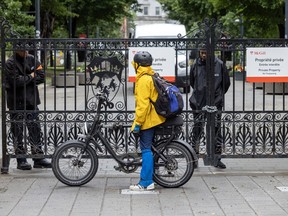In response to a Gazette access-to-information request, the university refused to release any documents related to the security firm that took down the camp.

Access to parts of the university has been restricted despite the dismantlement, with security personnel checking McGill identification cards.
“We understand that this phased reopening has posed significant challenges for some of our community members, and we truly regret these unavoidable impacts,” McGill told students and staff in an email on Thursday afternoon.
“We are grateful for the collaboration and understanding you have shown during this challenging period.”
As of Aug. 5, McGill ID cards will no longer be required and pedestrian, cyclist and vehicle access will be restored.
The campus will be open on weekdays between 6 a.m. and 10 p.m., and on weekends between 8 a.m. and 8 p.m.
The university said as of next week, all classes will take place in usual locations and on their usual schedules, and all buildings and libraries will return to their regular opening hours.
Pro-Palestinian groups set up the encampment on April 27. They demanded that McGill end its investments in businesses that profit from Israel’s military operation in Gaza, as well as end all affiliations with Israeli universities.
The camp was dismantled on July 10 by Sirco, a private security firm hired by McGill, with police in riot gear on standby.
At the time, McGill said it had “recently received information from the (security) firm that led the university to determine that the encampment needed to be dismantled urgently.”
In a statement that day, McGill president Deep Saini cited “significant health and safety risks” at the camp. He said illegal drugs were being sold, adding the area was “infested with rats,” with “a propane canister and flammable materials next to the tents.”
“This camp was not a peaceful protest,” Saini said. “It was a heavily fortified focal point for intimidation and violence, organized largely by individuals who are not part of our university community.”
Supporters of the encampment dismissed some of Saini’s claims.
The McGill chapter of Solidarity for Palestinian Human Rights, one of the groups behind the protest, said the university “fabricated evidence of drug use (and) sanitation hazards.”
After the camp was taken down, The Gazette submitted an access-to-information request to McGill regarding Sirco and what the security firm found on campus. McGill, which is publicly funded, is covered by Quebec’s access-to-information law.
The newspaper asked for documents that mention Sirco, including letters, emails, tender documents and reports submitted by the company.
In a written response on July 30, Edyta Rogowska, McGill’s secretary-general, said the university would not release documents in response to the newspaper.
She cited several sections of Quebec’s access law, including ones pertaining to “industrial secrets.”
Rogowska also pointed to a section of the law that says public bodies “must refuse to release or to confirm the existence of information concerning a method or a weapon that is likely to be used to commit a crime or a statutory offence.”
“In addition, documents have been withheld to protect professional secrecy, in accordance with … the Quebec Charter of Human Rights and Freedoms, and the Act respecting the Barreau du Québec,” Rogowska wrote.
The Gazette contacted McGill’s communications department regarding the decision to deny the newspaper’s access request. “We have nothing to add to the response,” a spokesperson said.
When answering access requests, public bodies can refuse to divulge information, either by redacting parts of documents to remove certain information or refusing to release entire documents.
In McGill’s case, no document was released, even in part.
